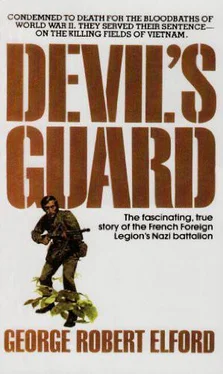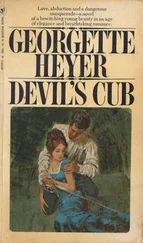He stopped, bowed slightly, and without looking at Schulze he returned to his place. “We are ready to face our executioners now,” he said aloud instead of sitting down, “for we are going to die for the people and when our bodies return to mother earth, for every drop of our blood a hundred avenging fighters will rise.”
Schulze stepped forward.
“Commissar Kwang seems to have told you what he wanted to say,” he began slowly, ignoring Kwang’s dramatic “farewell.”
“You have heard what he thinks of us colonialist officers. He called us rats, oppressors, dead men. I am addressing him as Commissar Kwang, and not a Communist murderer, which is what his kind really are. He may speak to you freely but I am sure that you have never seen a captured French officer speaking to you with the permission of a Viet Minh commissar. And you will never see one, for the Communists will never permit anyone to speak the truth, or to oppose them in any way. What Lenin, Stalin, and Mao Tse-tung have written down fills enough books to build a dam across the Mekong River. But once their ideology is put into practice, it does not work. It may hypnotize the people but it can never convince them of anything because Communism is the biggest fraud ever conceived by a few wicked men who wanted to get rich through robbery and murder.”
“Say, Erich!” Eisner cut in. “Speak in simple terms or you won’t have a chance of getting through. If you are going to use words like “ideology,”
“fraud,”
“hypnotize,* then you might as well speak German for all the good it will do.”
He paused for a moment, then added: “Just tell them Communism is a big lie and they will get you.”
He sat down. “I’ll bet they don’t even know what Communism means,” he said to me. “Ho Chi Minh isn’t using the term either.”
“I can tel! you in front of the agitators—” Erich went on.
“Merde!” Bernard interposed again. “They don’t know an agitator from Adam.”
“Shut up, will you?” Schulze snapped. “Or stand up and speak yourself.”
Riedl grinned and the prisoners smiled contentedly. Although we spoke German, they had obviously caught the meaning of our exchange. Eisner, however, accepted the challenge. He strode over to Schulze, cleared his throat, then pointing a straight, accusing finger at the Party men he bellowed: “The Lao Dong say that Ho Chi Minh is bringing freedom and a better life for you people, but it is a big lie! They are Communists, though they do not like to use the word for so many people around the world hate them; they talk of freedom, but they want it no more than you want cholera. When the Viet Minh comes to a village, the big leaders speak to the poor people, for it is only the poor people they can cheat. They point to the land of a rich owner and tell you: Kill the owner and you may have his land. In the big city they tell the poor people: Kill the owner of this large store and you may take the food from his shop without paying for it. But even children know that one cannot have food without paying for it. It was so ever since man was born on earth. They point to the house of a wealthy man and say: Kill the rich man and his house will be yours. But the house will not be yours. It will belong to the Lao Dong secretaries, to the commissars, or to some other big Viet Minh leaders; you just do the killing for them. We know that here, too, you killed the rich landowner and took his land. The Viet Minh lets you have the land for a short time, because the Viet Minh needs food. Without your help they cannot fight the French. But should the French leave your country, your lands will be taken away from you and you will have to work in a colchos.”
He paused for a moment waiting for Xuey to catch up, then went on. “Do you know what a colchos is? It is the Communist way of sowing and harvesting, a big piece of land where every villager is obliged to work. But the land does not belong to them and what they harvest will not belong to them either. If the Lao Dong party wins, the Communists will tell you what you must do and nothing will be yours—not even your huts.”
As Xuey interpreted for Bernard, I noticed breathless interest in the eyes of our audience. I began to hope that we were getting somewhere.
“They say,” Bernard went on, “That if the Viet Minh wins the war, you will no longer have to obey the orders of the French colonialists, or the rich landowners. That is not a He. If Ho Chi Minh wins the war, you will have to obey the orders of the Lao Dong party, the Viet Minh commissars and commanders. When you disobey the orders of a French colonialist, or an order of your landlord, you are beaten or put into a jail. But afterwards you are free to go to Saigon or to Hanoi to seek justice from the Big Police, or from the Big Tribunal Judge. And if you were innocent when punished, the rich landlord is going to be punished even though he is a Frenchman. But you all know what happens to people who disobey the orders of the Viet Minh. They are shot down like dogs and cannot seek justice anywhere anymore. The Communists don’t like complaints. They prefer cheers and clapping. And if they find out later that you were shot innocently, Ho Chi Minh will give you a big red medal, but that won’t bring you back to life.”
He paused for a while, then concluded his speech, at least for the time being. “They tell you that Father Ho and Comrade Mao are bringing you a better life. What the commissars are not telling you is that last year three million of your Chinese brothers died because they did not have anything to eat. The Russians are sending the Chinese people food, but Stalin is buying food from the big colonialist countries because his own people have nothing to eat either.”
Eisner gestured to Schulze to continue and dropped down between Riedl and me, grunting: “I don’t say it was perfect but what else could these halfwits understand?” Commissar Kwang lifted his hand, indicating that he wanted to speak. Erich allowed him to proceed.
“There is always something to learn,” Kwang said mildly, speaking to the people. “The colonialist officer said that everything written by comrades Stalin, Mao Tse-tung, or Ho Chi Minh is a lie. But then we should also believe that the Soviet Union does not exist, that Comrade Mao did not liberate China, and the Viet Minh is nothing but a dream.”
“It’s not a dream but a bloody nightmare,” Karl growled, as Kwang went on.
“The Great Proletarian Revolution has already liberated the oppressed people in one third of the world, yet the colonialist officer is saying it is a lie.”
“Let us talk about one thing at a time, the Soviet Union, for instance,” Schulze suggested, “Otherwise these good people here might become confused, Commissar Kwang. I know that you prefer to talk in a confusing manner—that is an important component of the brainwashing tactic. Have you ever been in the Soviet Union, Commissar Kwang?”
“Yes!” Kwang hissed. “I have been there and I saw what the great revolution has done for the people.”
“What people?” Schulze asked bluntly.
“For the poor people, of course,” said Kwang. “We are not interested in the welfare of the rich.”
“What happened to the rich people in Russia?”
“Their wealth was taken from them and they were made to work for a living,” propagandist Kly interposed. Kwang nodded in assent.
“Like hell!” Schulze erupted. “Their lives were taken from them and the few survivors were sent to work, not for a living, but in labor camps without pay. Stalin murdered ten million people, if that is what you call great revolution, Tovarich Kly.”
“Who needs rich parasites?” Kly shrugged. “The people don’t need them.”
“Propagandist Kly… the Viet Minh are murdering every rich person in this country. I hope you don’t want to say that in Russia it has not been so.”
Читать дальше












